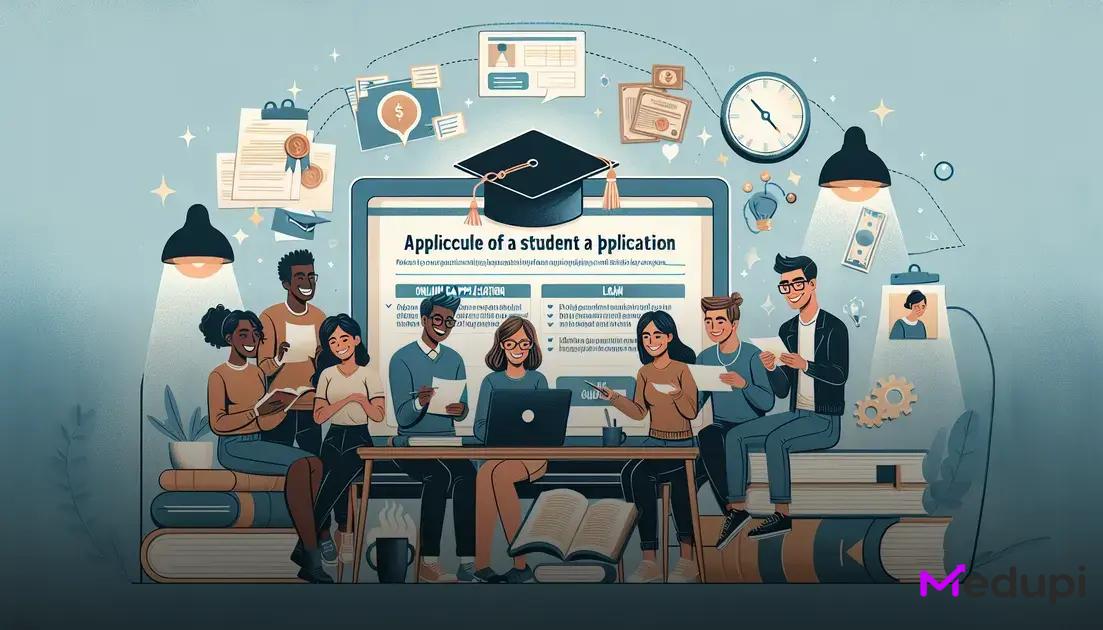ADVERTISEMENT
Student loans can be a lifesaver when it comes to financing your education. However, understanding how they work, how to apply for them, and how to manage repayment can be daunting.
Understanding different types of student loans
Student loans come in various forms, each designed to meet different needs and circumstances. Federal student loans are provided by the government and typically offer lower interest rates and more flexible repayment terms. These include Direct Subsidized Loans, which are need-based and where the government pays the interest while you’re in school, and Direct Unsubsidized Loans, available to all students regardless of financial need. Another type is the Direct PLUS Loan, often taken out by parents to help cover the costs of their child’s education.
ADVERTISEMENT
On the other hand, private student loans are provided by banks, credit unions, or other private lenders. While they can cover gaps in funding where federal loans fall short, they usually come with higher interest rates and less flexible repayment options. It’s crucial to understand the terms and conditions before opting for private loans.
Interest Rates and Fees
The interest rates on student loans can vary significantly. Federal student loans have fixed rates, while private student loans can have either fixed or variable rates. Fixed rates stay the same over the life of the loan, whereas variable rates can change, potentially increasing your monthly payments. Additionally, some loans may come with origination fees, which are a percentage of the loan amount taken as a fee by the lender.
ADVERTISEMENT
Loan Forgiveness Programs Certain federal student loans are eligible for forgiveness programs, such as the Public Service Loan Forgiveness (PSLF), which forgives the remaining loan balance after 120 qualifying monthly payments under a qualifying repayment plan. These programs can significantly reduce the total amount you need to repay, making federal loans a viable option for those considering careers in public service or non-profit sectors.
By understanding the various types of student loans available, students and their families can make informed decisions about financing education without unnecessary stress.
How to apply for a student loan

Check Your Eligibility
Before applying for a student loan, it’s important to check if you meet the eligibility criteria. Different loans have different requirements, so look into the specifics of each option to ensure you qualify.
Gather Necessary Documents
You’ll need various documents to complete your application, such as identification, financial records, and proof of enrollment. Having these ready will streamline the process.
Fill Out the Application Form
Most applications can be completed online on the lender’s website. Ensure you provide accurate and complete information to avoid delays. Double-check your entries before submitting.
Submit the Application on Time
Deadlines are crucial. Submit your application well before the deadline to avoid any last-minute issues. Lenders often have specific cut-off dates for different types of loans.
Wait for Approval
After submission, you’ll need to wait for the lender’s approval. This can take a few days to several weeks, depending on the lender’s processing time. Check your email regularly for communication from the lender.
Review the Loan Terms
Once approved, carefully review the loan terms and conditions. Understand the interest rates, repayment schedule, and any fees involved. Don’t hesitate to ask your lender if you have any questions.
Finalize the Loan
If you agree with the terms, finalize the loan by signing the agreement. This is a binding contract, so ensure you fully understand your obligations. Keep a copy of all documents for your records.
Repayment plans and options
Repaying your student loans doesn’t have to be daunting. Various repayment plans are available to suit your financial situation.
The Standard Repayment Plan allows you to make fixed monthly payments over ten years. This option may lead to higher payments but ensures you pay less interest overall.
For those seeking smaller monthly payments, the Graduated Repayment Plan is ideal. Payments start lower and increase every two years, making it manageable early in your career.
Income-Driven Repayment Plans adjust your payments based on your income and family size. This is perfect if your earnings are low initially. These plans include:
- Income-Based Repayment (IBR)
- Pay As You Earn (PAYE) and Revised Pay As You Earn (REPAYE)
- Income-Contingent Repayment (ICR)
If you work in public service, consider the Public Service Loan Forgiveness (PSLF) program. After making 120 qualifying payments, your remaining debt may be forgiven.
Some lenders offer the Extended Repayment Plan for loans over $30,000, extending payments up to 25 years.
Managing your student loan debt
options and choose one that fits your budget. Remember that you can switch plans if your financial situation changes. Effective repayment strategies will reduce stress and help you manage your loans efficiently.

Develop a Budget
Begin by creating a budget to understand how much you can allocate towards your student loan payments. Track your income and expenses to identify areas where you can cut back. This will help you stay on track and avoid missed payments.
Consider Income-driven Repayment Plans
If you’re struggling to make payments, look into income-driven repayment plans. These plans adjust your monthly payment based on your income and family size. They can provide significant relief and prevent defaulting on your loans.
Explore Loan Forgiveness Programs
Certain professions, such as public service and education, may qualify for loan forgiveness programs. Research eligibility criteria and apply if you meet the requirements. Loan forgiveness can substantially reduce your debt burden.
Consolidation and Refinancing
Consolidation involves combining multiple loans into one, while refinancing can lower your interest rates. Both options can simplify your payments and reduce the overall cost of your loans.
Stay Informed
Keep yourself updated on any changes to student loan laws or repayment options. Being informed will help you make better decisions regarding your loans.
Seek Professional Advice
If managing your student loan debt becomes overwhelming, consult a financial advisor. They can provide personalised guidance and help you create a strategy that suits your financial situation.
Tips for paying off student loans faster
When you’re ready to tackle your student loan debt head-on, having a strategic plan can make all the difference. Here are several actionable tips to help you pay off your student loans faster.
-
Make Extra Payments Whenever Possible
Pay more than the minimum whenever you can. Extra payments reduce the principal balance quicker and lower the amount of interest over time. Even small additional payments add up.
-
Refinance Your Student Loans
Refinancing can lower your interest rate, which means more of your payment goes toward the principal. This can help you save significant amounts over the loan’s lifetime. Shop around to find the best rates and terms.
-
Create a Budget and Stick to It
A well-planned budget helps you identify areas where you can cut spending and allocate more money toward loan payments. Prioritise your student loans to expedite paying them off.
-
Enroll in Auto-Pay
Many lenders offer interest rate discounts for signing up for automatic payments. This ensures you never miss a payment, possibly reducing your interest rate and helping you stay on track.
-
Utilise Windfalls
Whenever you receive unexpected money, like tax returns or bonuses, use it to make extra payments on your student loans. This can significantly reduce your balance.
-
Consider Helping from Your Employer
Some employers offer student loan repayment assistance programs as part of their benefits package. Check with your HR department to see if this is an option for you.
-
Use a Debt Avalanche Method
Pay off loans with the highest interest rates first while making minimum payments on others. This method can lower total interest paid over time.





